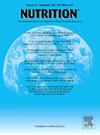压力会影响水果和蔬菜的摄入量吗?一项随机对照试验测试了以计划为中介、压力为调节的模型。
IF 3.2
3区 医学
Q2 NUTRITION & DIETETICS
引用次数: 0
摘要
目的与压力较小的人相比,压力较大的人往往摄入较少的水果和蔬菜。因此,为了促进水果和蔬菜(FV)的消费,行动规划已被证明能有效地将行为意图转化为实际的饮食行为。本研究旨在评估一项为期 7 天的干预措施,该措施旨在改善果蔬计划和摄入量,同时还考察了压力的作用:试验采用 3(时间:前测、后测和随访)*2(组别:干预组与对照组)的参与者间因子设计。共有99名中国年轻成年人(年龄=23.84岁±4.63岁,26名男性)参加了为期7天的在线随机对照试验,他们都明确表示要多吃水果和蔬菜:结果:干预成功地提高了果蔬计划和果蔬摄入量。此外,调节中介模型显示,果蔬计划对实验条件和果蔬摄入量之间的关系起到了中介作用,而压力则对这种中介作用起到了调节作用。具体来说,压力水平低的人通过计划促进了FV摄入量,而压力水平高的人则没有观察到这种效应:这些研究结果证实了计划干预对改善低脂食物摄入量的积极影响,尤其是对压力水平较低的个体,并强调压力是改变健康行为的障碍,值得在今后的研究中进一步关注。本文章由计算机程序翻译,如有差异,请以英文原文为准。
Does stress compromise fruit and vegetable intake? A randomized controlled trial testing a model with planning as a mediator and stress as a moderator
Objective
Individuals experiencing higher stress levels tend to consume fewer fruits and vegetables compared to their less stressed counterparts. Thus, to promote fruit and vegetable (FV) consumption, action planning has been proven effective in translating behavioral intentions into actual dietary behaviors. This study aims to evaluate a 7-day intervention designed to improve FV planning and intake, while also examining the role of stress.
Methods
The trial employed a 3 (time: pretest, post-test, and follow-up) * 2 (group: intervention vs. control) between-participant factorial design. A total of 99 young Chinese adults (age = 23.84 years ± 4.63, 26 men) who had formed an explicit intention to consume more fruit and vegetables, participated in a 7-day online randomized controlled trial.
Results
The intervention successfully enhanced FV planning as well as FV intake. Furthermore, a moderated mediation model revealed that FV planning mediated the relationship between experimental conditions and FV intake, with stress moderating this mediation. Specifically, planning facilitated FV intake for individuals with low stress levels, while this effect was not observed for those with high stress levels.
Conclusion
These findings confirm the positive impact of the planning intervention on improving FV intake, particularly for individuals with low stress levels, and highlight stress as a barrier to health behavior change that warrants further attention in future studies.
求助全文
通过发布文献求助,成功后即可免费获取论文全文。
去求助
来源期刊

Nutrition
医学-营养学
CiteScore
7.80
自引率
2.30%
发文量
300
审稿时长
60 days
期刊介绍:
Nutrition has an open access mirror journal Nutrition: X, sharing the same aims and scope, editorial team, submission system and rigorous peer review.
Founded by Michael M. Meguid in the early 1980''s, Nutrition presents advances in nutrition research and science, informs its readers on new and advancing technologies and data in clinical nutrition practice, encourages the application of outcomes research and meta-analyses to problems in patient-related nutrition; and seeks to help clarify and set the research, policy and practice agenda for nutrition science to enhance human well-being in the years ahead.
 求助内容:
求助内容: 应助结果提醒方式:
应助结果提醒方式:


